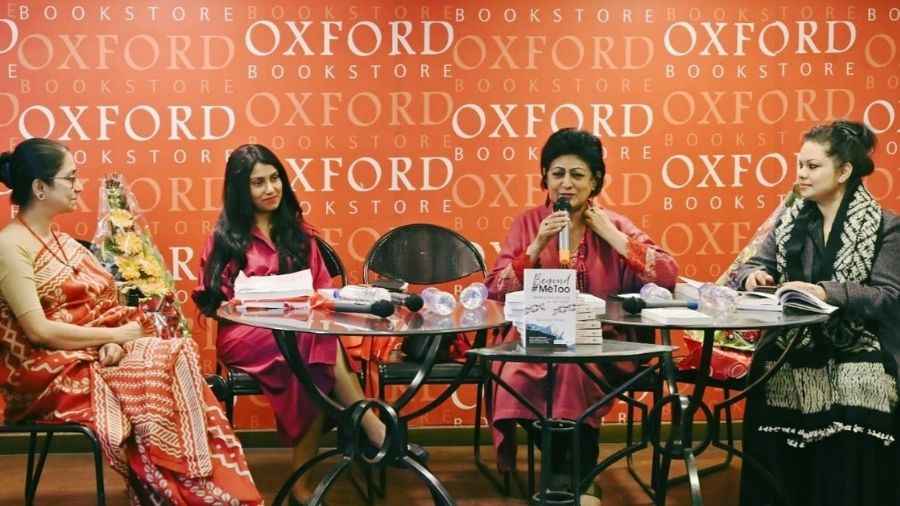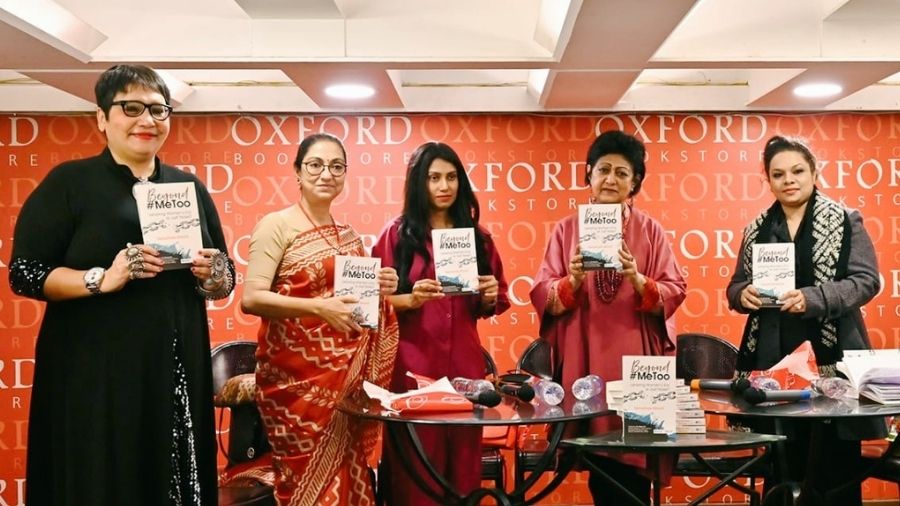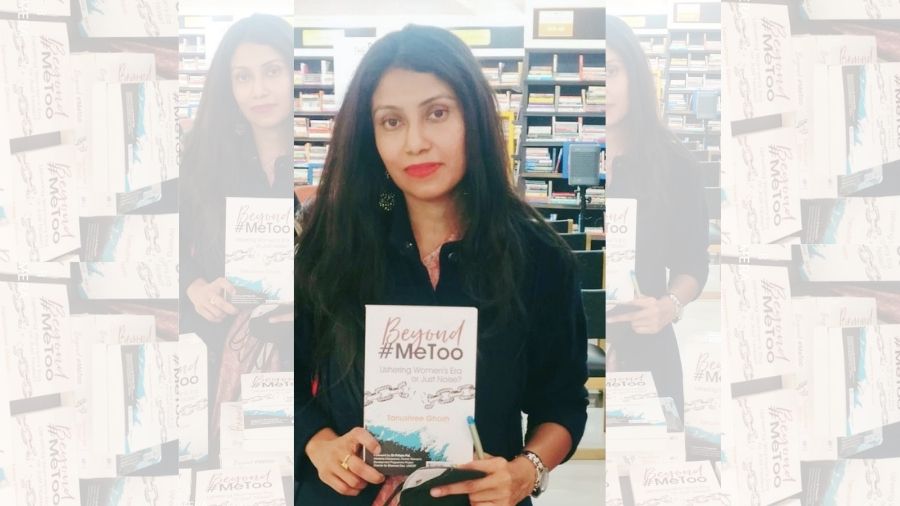Tanushree Ghosh is an author. She’s an activist. Most importantly, she’s a mother.
The question, ‘Why do mothers have to bring their girl children into a world so cruel?’ has a permanent place in her thoughts.
The 40-year-old is on a mission to curb discrimination against women and gender-based violence through the power of words. Ghosh contributes to several publications including The Huffington Post, The Tribune, Women’s Web and Cafe Dissensus, among others, primarily writing on social issues.
“If I am lucky enough to be born with privilege, I need to make a difference,” says Ghosh, who runs a non-profit organisation – Her Rights – that caters to the upliftment of women. Ghosh is also a full-time tech analyst at Intel in the US.
The author’s second book, Beyond #MeToo – Ushering Women’s Era or Just Noise? (published by SAGE) was launched at Oxford Book Store on January 6.
My Kolkata caught up with Ghosh to talk about her book, her life, how Kolkata’s youth can help take society a step forward, and much more.
My Kolkata: First things first, who is Tanushree Ghosh?
Tanushree Ghosh: I am an author. I have a PhD in chemistry, but my heart has always been set on writing. Every time I thought of venturing out, I was forced to put it off because I had not completed the intangible to-do list life bestows upon Indian women. I hadn’t completed my PhD, I was not married and then came my first child (a blessing, no doubt!). In 2017, I realised that I’m always going to be caught up with this to-do list, so I should start NOW.
I write short stories, satire, fiction and non-fiction. But I enjoy writing on gender rights and gender-based violence the most as I feel very strongly about both.
India first got a glimpse into your writing when The Huffington Post (now, HuffPost) published your article, “I Always Thought I'd Return Home to India – Until I Had a Daughter’’ in 2017. Was that a turning point in your career?
Yes! My writing journey began with that specific article. When I wrote in to The Huffington Post in 2017, everyone told me not to — because it’s a renowned publication and I had never been published. I submitted the piece anyway and it ended up garnering so much attention. It went viral overnight!
The article speaks about how my thought process changed after I gave birth to my daughter. I found myself constantly fighting questions like ‘Do I want to raise a girl child in this country?’ and ‘Will I be able to raise her without being in constant paranoia?’. In the end, I decided to stay in the US and raise my daughter there. However, I come back to Kolkata very often.
The #MeToo movement began 15 years ago and has seen a myriad of authors write on the movement. Why did you decide to write a book on #MeToo in 2021?
When my daughter asks me, ‘Why are boys and girls treated differently?’ I don’t have an answer. That’s why I wrote Beyond #MeToo – Ushering Women’s Era or Just Noise?
If one wants to learn about gender rights, there are either highly credited academic papers by the likes of Kalpana Kannabiran and Kamla Bhasin available or independent op-ed pieces that cover specific issues. I couldn’t find any literature that spoke to the college-going population of the world while also maintaining academic integrity. So, I decided to bridge this gap and write a book that covers gender rights in a conversational language.

(L-R) Ruma Chakraborty, Tanushree Ghosh, Oindrilla Dutt and Antara Banerjee at the book launch in Oxford Book Store
What is the crux of Beyond #MeToo?
Beyond #MeToo is about women in the past, women today and women in the future. It is centred around the #MeToo movement. I noticed that there was a lot of enthusiasm around the movement in the West, but didn’t get enough attention in India. This got me into researching the history of feminist movements both in the US and India, women rights movements, the issue that causes gender discrimination and gender-based violence, and how the two are interrelated.
I wanted to answer the question: ‘Is the impact of the #MeToo movement as significant in India as it is in the rest of the world?’
How important is the ‘Ushering Women’s Era or Just Noise?’ part of the title?
The subtitle is definitely important. India has had several movements for women’s rights before #MeToo. In fact, I believe that India has had far better movements like the Vishaka movement, which created a larger impact than #MeToo. But has anything changed in India?
Or, are all our efforts simply regarded as noise?

India has had several movements for women’s rights before #MeToo. In fact, I believe that India has had far better movements like the Vishaka movement, which created a larger impact than #MeToo
Does Beyond #MeToo put an end to the tired ‘Men are subjected to this too’ response that is constantly thrown at women activists?
Every time I write a book or a piece on women’s rights, I always receive flack from at least one man stating that they go through the same thing or in some situations, far worse, if they are falsely accused. So, in this book, I tried to really look into the issue using data, statistics and human experiences for a concrete conclusion.
I won’t give away the conclusions I came to. It will spoil the read!
Beyond #MeToo explores gender rights and gender-based violence in Latin America, Japan, the USA and India. Where does India stand in comparison to other countries?
Actually, India is not very different in comparison to other countries. Local and cultural manifestations are different, yes. However, the basic problem of discrimination between genders and gender-based violence is prevalent in every country.
Progress in the western world has also begun fairly recently. India began fighting against discrimination at the same time as most countries. In fact, India has robust laws in comparison to many other countries. The only difference between our nation and the rest of the world is the rate at which the mindset of society is changing. India seems hell-bent on adopting a patriarchal culture.

The panellists discussed how the youth of India can help implement change so the world is safer for women
Men and women have ingrained biases that stem from being raised in a patriarchal society. What can Kolkata’s youth do to change this, even if it’s a small change?
The youth of the city must make an effort to identify the soft patriarchy that prevails in our society. Hard patriarchy is easily identified and is relatively easier to fight. For example, if someone comes up to a woman and tells her that she can’t do a certain task because she’s a woman, she will see that as wrong and fight it. However, in situations where the unjust lies in implicit biases and women themselves don’t know any better, that’s when the real problems arise.
Kolkata’s youth, men and women, should constantly be on the lookout to identify these implicit biases. You have to practice looking at everyone and everything through a gender-neutral lens. If something upsets you, stop immediately and ask yourself: ‘Would I feel the same way if this person was a man?’. If you find yourself giving someone even the smallest leeway, stop and ask yourself: ‘Would I give this leeway to both a man and a woman?’
It will take us a lot of time and practice to reach a point where youngsters can easily identify and fight against soft patriarchy. The only way to achieve this is to constantly question ourselves, unlearn and re-learn.
What can young girls do to stand up against the soft patriarchy usually imposed by their family members without being labelled ‘rebellious’?
I remember, when I was probably around 16-years old, my parents would make my younger brother (who was nine years younger than I was), escort me to places. Growing up, I wasn’t allowed to play outside the house, I wasn’t allowed to study the field of engineering I wanted to and I wasn’t allowed to do many things my younger brother was allowed. I could never understand the reasoning behind it. All I ever thought was ‘Why can’t I?’

My advice to young girls is to understand that until and unless the ecosystem around us changes, women will continue to be subjected to discrimination. That’s why movements like #MeToo is so important – there’s power in numbers
My advice to young girls is to understand that until and unless the ecosystem around us changes, women will continue to be subjected to discrimination. That’s why movements like #MeToo is so important – there’s power in numbers. One young girl standing up to her parents on a certain issue will not have the same impact as multiple girls standing up to their parents together. So, my first tip would be to find a cohort. The second tip that I would like to share, and this tip is for women of all ages, is accept that your parents will not change their mindset immediately, if they change at all.
Remember, your happiness is as important as theirs.
Social media has been key to the #MeToo movement and activism in general. Does it, at times, have a negative impact?
Social media was the foundation of the #MeToo movement. However, at the same time, it has several cons. The most significant con is that once a man is accused, the ‘innocent until proven guilty’ school of thought goes out the door. In cases when men are wrongfully accused, a lot of serious damage is caused.
Even then, I’d say that the pros outweigh the cons. Many women have tried to go through the judicial system, but have rarely encountered a positive outcome. So, as long as the ecosystem and our laws remain the same, social media activism will prevail. Social media gives women a platform and the opportunity to start a dialogue. What is crucial to remember is that a dialogue is not a judgement.
What readings would you suggest so the younger generations can become more aware of gender rights and gender-based violence?
If you’re looking for an academic read, then Uma Chakraborty’s Gendering Caste Through a Feminist Lens is a great place to start. But I know the generation today and everyone is very preoccupied. So, I would recommend social media, PDFs of excerpts available online and UN reports. I personally follow Kavita Krishnan and a few others on Twitter.
